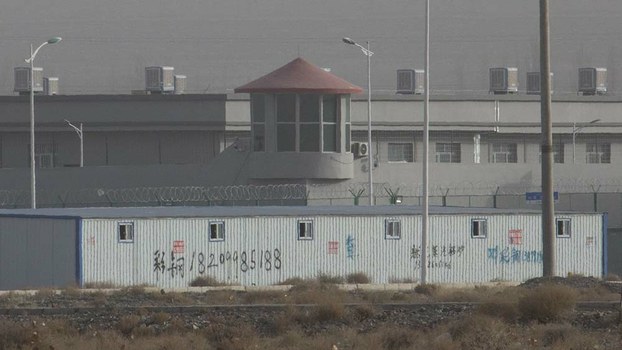The U.S. Senate late on Wednesday unanimously passed the first legislation by any nation in response to human rights abuses against ethnic Uyghurs in northwest China’s Xinjiang Uyghur Autonomous Region (XUAR), which would authorize regular monitoring of the situation by various government bodies.
The bipartisan Uyghur Human Rights Policy Act, introduced by Senators Marco Rubio of Florida and Bob Menendez of New Jersey, would appoint a special State Department coordinator on the XUAR and require regular reports on the region’s internment camps, surveillance network and security threats posed by an ongoing crackdown on the Uyghur people—if ratified by the House of Representatives.
Rubio on Wednesday called the bill “an important step in countering the totalitarian Chinese government’s widespread and horrific human rights abuses” in the XUAR, including the incarceration of more than 1.5 million Uyghurs and other Muslim minorities accused of harboring “strong religious views” and “politically incorrect” in a vast network of internment camps since April 2017.
“It’s long overdue for the United States to hold Chinese government and Communist Party officials accountable for the systemic and egregious human rights abuses and probable crimes against humanity in Xinjiang,” the republican lawmaker said.
“I urge the House to swiftly pass this legislation and send it to the President’s desk” to be signed into law.
Menendez on Wednesday welcomed the Senate’s passage of the bill.
“This legislation makes clear that Congress will not turn a blind eye as millions of Uyghur Muslims are unjustly imprisoned, subjected to a mass surveillance state, and forced into labor camps by an autocratic regime,” said the democrat from New Jersey.
“And while the Trump Administration has not seen fit to make the tragic situation in Xinjiang a priority, I am happy to see Congress is taking the necessary steps to hold accountable officials in the Chinese government and Communist Party responsible for gross violations of human rights and possible crimes against humanity.”
Under the legislation, the U.S. Director of National Intelligence, in coordination with the State Department, will compile a report detailing the regional security threat posed by the crackdown in the XUAR and the frequency with which Central Asian nations are forcibly repatriating Uyghur refugees to China, as well as which Chinese companies are involved in the construction and operation of the camps.
The Federal Bureau of Investigation will be tasked with providing a report on efforts to inform and protect U.S. citizens and legal permanent residents, including Uyghurs, from Chinese government harassment and intimidation on American soil.
The bill also calls for high-level U.S. engagement on the issue, the application of Global Magnitsky Act and related sanctions against XUAR Communist Party Secretary Chen Quanguo and other officials deemed responsible for repressive policies against Uyghurs in the region, and a review of Commerce Department export controls and end user restrictions.
A complimentary bill—HR 649—was proposed in January by U.S. Representatives Chris Smith of New Jersey and Tom Suozzi of New York, who warned in a statement at the time that the XUAR has “become nothing short of a police state” and urged fellow lawmakers to “take a stand against this violation of human rights and show the Chinese government that this is unacceptable.”
China responds
On Thursday, Chinese Foreign Ministry spokesperson Hua Chunying told reporters at a regular briefing in Beijing that China “firmly opposes” the passage of the Uyghur Human Rights Policy Act, which she said was “in total disregard of facts” regarding policies in the XUAR.
“Such flagrant interference in China’s internal affairs will only make the Chinese people more indignant,” she said.
“We urge the U.S. side to respect facts, return to reason, discard the Cold-War mentality, stop taking Xinjiang-related issues as a pretext to interfere in China’s domestic affairs, and stop pushing the bill to become law so as to prevent damages to the overall relationship between China and the U.S.”
While Beijing initially denied the existence of the internment camps, China this year changed tack and began describing the facilities as “boarding schools” that provide vocational training for Uyghurs, discourage radicalization, and help protect the country from terrorism.
But reporting by RFA’s Uyghur Service and other media outlets suggest that those in the camps are detained against their will and subjected to political indoctrination, routinely face rough treatment at the hands of their overseers, and endure poor diets and unhygienic conditions in the often overcrowded facilities.
Rights groups weigh in
Rights groups applauded the Senate for passing the bill, with Sophie Richardson, the China director at New York-based Human Rights Watch, calling it an “important step toward accountability and, hopefully, an end to this nightmare for #Uyghurs and others arbitrarily detained in #Xinjiang” in a tweet late on Wednesday.
Washington-based Uyghur Human Rights Project also welcomed the passage, saying it had sent “a powerful message to Beijing” and should “serve as an example to other nations.”
“The human rights crisis in East Turkestan shocks the conscience,” said UHRP director Omer Kanat, using the Uyghurs’ name for the XUAR.
“We are seeing the beginnings of worldwide actions to respond to it,” he added.
The group called for “swift action” from the House of Representatives to pass the act’s companion bill.
Dolkun Isa, president of the Munich-based World Uyghur Congress (WUC), said the Senate approval of the bill was “of historic significance” and also called for the House of Representatives to act quickly in passing the companion legislation.
“At a time when the Uyghur people in East Turkestan are enduring crimes against humanity committed by the Chinese government, it is imperative for the world’s greatest democracy to take the lead and defend their legitimate rights through legislation,” he said.
“This piece of legislation, once passed, will ensure the continued existence of the Uyghur people and their civilization.”

